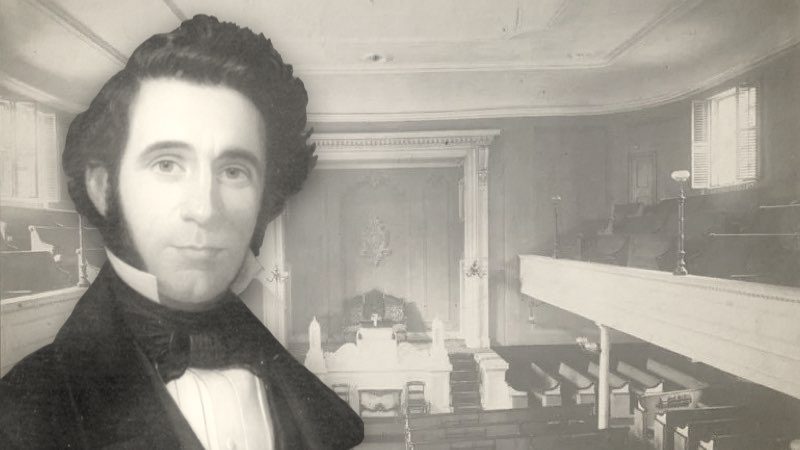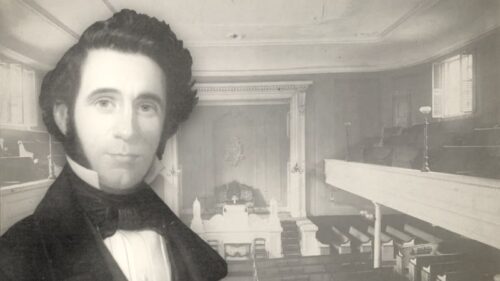-
Article 18 – The Two Ordinances
Articles Of The Faith And Order Of A Primitive Or Strict And Particular Baptist Church Of The Lord Jesus Christ, Based On The Declaration Of Faith And Practice Of John Gill, D. D., 1720 XVIII. The Two Ordinances. We believe that Baptism and the Lord’s Supper are the only two symbolical ordinances enjoined in the Gospel; all other ritualistic forms and ceremonies being disallowed and forbidden by the Word of God. ------------------------------- Mal 3:7; Matt 5:19; 15:9; 28:20; Col 2:20-23, read verse 20, “are ye subject to (humanly devised and unscriptural) ordinances”? Annotations: Sacramentalists and Evangelicals. Note 1.—It is customary to divide Christendom into Protestant and Catholic. It were better to divide it into the Evangelical and the Sacramental sections. These are sharply distinguished by…
-
Article 17 – Pastors And Deacons
Articles Of The Faith And Order Of A Primitive Or Strict And Particular Baptist Church Of The Lord Jesus Christ, Based On The Declaration Of Faith And Practice Of John Gill, D. D., 1720 XVII. Pastors and Deacons. We believe that the officers of Christian churches are Pastors, (or Bishops,) and Deacons, and that the right of choosing these is vested in each individual Church as such. That a Pastor’s duties are spiritual, namely, to tend the flock of God; to administer the ordinances of His house; to expound the Word and preach the Gospel; instruct inquiring sinners; visit the sick; and generally to watch for the souls of those under his care as one “that must give an account.”[1] That Deacons are honorary servants…
-
16 The Lord’s Supper
The Lord's Supper in its institution, and also as to its symbolic import, as well as in its relation to Christian life and doctrine, has already been considered. It would be useless, in this place, to attempt a history of the rite, especially a detail of the perversions of its uses, the bitter controversies concerning it, or the false claims set up for its sacramental efficacy in working grace in its subjects. The one question with which we are now concerned is a purely denominational one, having reference to the proper subjects of the ordinance, and the spiritual and ritual qualifications of those who partake of it. Also as to the proper and rightful authority of the Church in restricting its use, and judging of…
-
Chapter 19—On Communion, Answering The Charge Of Uncharitableness
Mr. Bridgman: "St. Paul's rule of admission to Christian communion is this, As many as Christ has received, let us receive. Rom. 15:7. The whole of Chap. xiv. is applicable, and especially the 15:5, 6, 7. I wish you could be made to blush for your inconsistency— I mean not yours alone, but of your party." My Reply: 1. Wherein have we differed from Paul's rule in the admission to communion? For that is all still to be discovered and to be proved. You must prove that any one was ever admitted to communion, without being first added to the church, and that there ever was one added to the church without being first baptized on a personal profession of faith in Christ, or that…
-
Chapter 18—On Communion, Answering The Charge Of Denominationalism
Mr. Bridgman: "Yours is a Baptist rule, not an apostolical —not Christian—not Christ's rule. It is the rule of a party, and therefore schismatical, because it rends the beautiful garment of Christian love." My Reply: 1. "Yours is a Baptist rule." This we are quite ready to admit, and are by no means ashamed of it, nor disposed to conceal it, or deny it; for we have a good conscience in it as such, on the authority of the word of God, as we can find no authority therein for any gospel rule to the contrary. For our great Christ was a Baptist, being baptized in the cold water of the river of Jordan; and he was a Baptist minister, for he made, and by…
-
Chapter 17—On Communion, Answering The Proof For Open Communion In John 3:5
Mr. Bridgman: "St. Paul's criterion would not be cold water, little or much, but the living water of the Spirit, such as Christ spoke of to Nicodemus, and at the last day of the feast." John iii. 5. vii. 37. My Reply: 1. If your spirit never be admitted into heaven till you can prove that Paul the apostle as the Lord's servant ever admitted, or that the sentiment as the truth of God ever entered his heart to admit, persons to the table of the Lord without their being first baptized on a personal profession of their faith in our Lord Jesus Christ, you will never, no never, see the face of Jesus, my brother. 2. The work of divine grace in the heart,…






